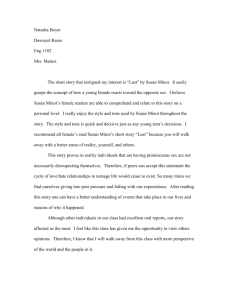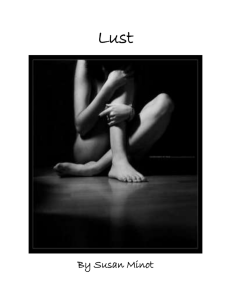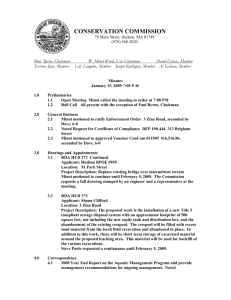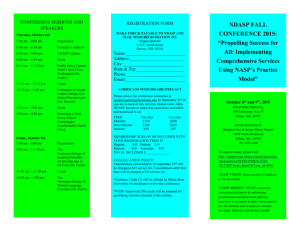Watson 1 Savanah Watson Professor Camargo ENGL 2100 21
advertisement
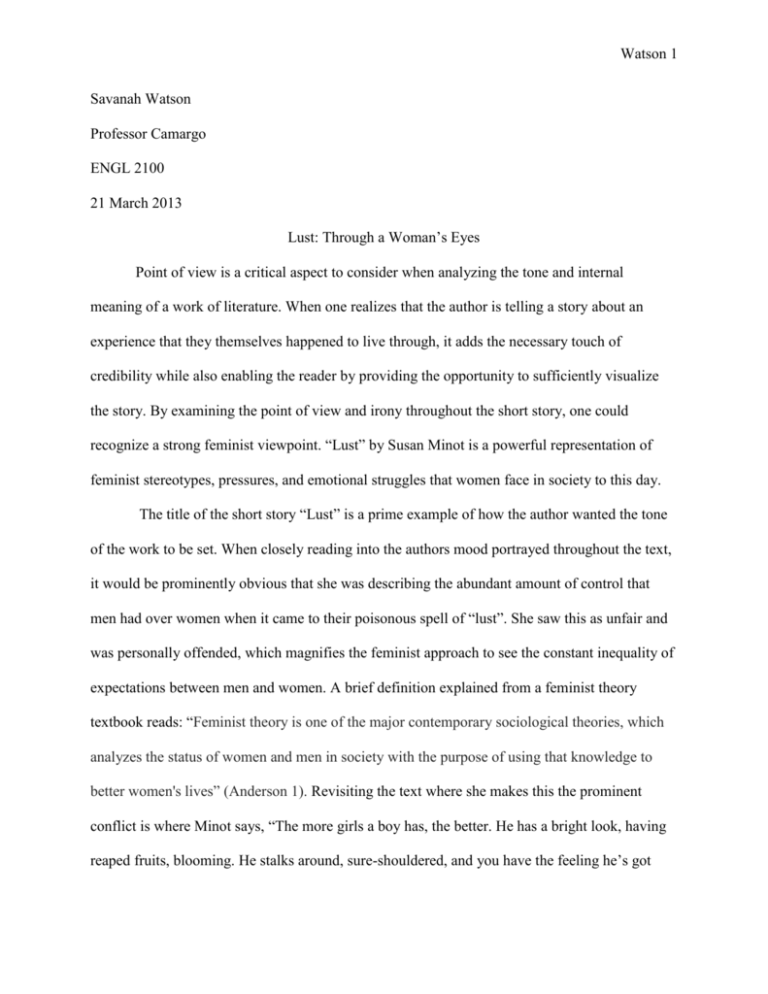
Watson 1 Savanah Watson Professor Camargo ENGL 2100 21 March 2013 Lust: Through a Woman’s Eyes Point of view is a critical aspect to consider when analyzing the tone and internal meaning of a work of literature. When one realizes that the author is telling a story about an experience that they themselves happened to live through, it adds the necessary touch of credibility while also enabling the reader by providing the opportunity to sufficiently visualize the story. By examining the point of view and irony throughout the short story, one could recognize a strong feminist viewpoint. “Lust” by Susan Minot is a powerful representation of feminist stereotypes, pressures, and emotional struggles that women face in society to this day. The title of the short story “Lust” is a prime example of how the author wanted the tone of the work to be set. When closely reading into the authors mood portrayed throughout the text, it would be prominently obvious that she was describing the abundant amount of control that men had over women when it came to their poisonous spell of “lust”. She saw this as unfair and was personally offended, which magnifies the feminist approach to see the constant inequality of expectations between men and women. A brief definition explained from a feminist theory textbook reads: “Feminist theory is one of the major contemporary sociological theories, which analyzes the status of women and men in society with the purpose of using that knowledge to better women's lives” (Anderson 1). Revisiting the text where she makes this the prominent conflict is where Minot says, “The more girls a boy has, the better. He has a bright look, having reaped fruits, blooming. He stalks around, sure-shouldered, and you have the feeling he’s got Watson 2 more in him, a fatter heart, more stories to tell. For a girl, with each boy it’s as though a petal gets plucked each time” (Minot 43). The short story begins with Minot describing her personal accounts of dating in her teenage years. One can see how she struggled with society’s pressure on her role as a female in the community while also living up to her female expectations. Women during the late sixties and seventies were expected to be submissive and serve their male significant other with all the sexual desires that they wished for in addition to being submissive and homely. Women’s feelings were looked at as irrelevant and not as important as fulfilling the physical needs in an intimate relationship. By taking this small generalization and realizing that the author was not only using this opportunity to discuss her hardships, but also be used to relate to her fellow females that were placed in the same emotion-wrenching boat. The idea that physical relationships were only important to men, whereas women were more so interested in the emotional support in a relationship is simply another example of how men are the dominant role in a relationship whereas women are just needy. This assumption is relevant throughout the text especially when Minot says: “Tim’s line: ‘I’d like to see you in a bathing suit.’ I knew it was his line when he said the exact same thing to Annie Hines” (Minot 4). As also being described in feminist theory text as proving mens abusive language and disrespect, “Theories of gender oppression go further than theories of gender difference and gender inequality by arguing that not only are women different from or unequal to men, but that they are actively oppressed, subordinated, and even abused by men” (Anderson 3). One is able to feel the personal heartbreak and struggle through the careful words that are chosen by the author. She tends to use delicate lines filled with deep emotion and empathy for all women throughout society to be able to relate with. In the text, she does not fail to show the male Watson 3 perspective, of course through her feminist views, as she emphasizes the females mistreatment throughout the text and in society as a whole. While she does not tend to blame the male population, she still seems to portray women as a type of victim in a male dominant world. Not only does this give women a lower stance on the social ladder, but it also supports the theory presented of how they are more interested in the emotional aspects of a relationship. By making women appear as if they cling onto the every hanging last word by a significant other and let the persuasive lust take over their brain, women are looked at in a light of pity. While it is easy to realize that a feminist approach on a story presented by a female who is speaking out for the unfairness, there is much more to her purpose of writing this story. It is important to realize that this was not a work of advocacy at all. If by accomplishing a story that leaves the reader with the sour taste of women always whining as usual, and how men are always getting what they want in the bedroom with lack of romantic effort or any effort at all, Minot nailed it. Unfortunately, from a feminist perspective it was a bit of what an advocate would refer to as a monstrosity or disaster. While it is noteworthy and brave to speak out and let her ideas be heard and deemed recognized as unfair to society, the author could have used a more “woman power” approach to show that women could come together to stop all male dominant insanity. The lens of feminism highlights Minot’s attitude towards her personal interactions with men. She takes advantage of the opportunity to express her thoughts of her feelings and uses a journal narrative style of approach to let the reader take a walk through her shoes and see some of her views. While the text had elements of humor, personal acclaims, and entertaining stories, the author does an outstanding job of getting the main point out on the table. The entire short story can be summed up in a simple thought from Minot as follows: “You stare into their eyes. They flash like all the stars are out. They look at you seriously, their eyes at a low burn and their Watson 4 hands no matter what starting off shy and with such a gentle touch that the only thing you can do is take that tenderness and let yourself be swept away. When, with one attentive finger they tuck the hair behind your ear, you- you do everything they want. Then comes after. After when they don’t look at you... You seem to have disappeared” (Minot 80-81). Women still need to keep their guard up. Never let a man get their lust spell over on you. And, by all means, it is crucial for a woman to never ever let these monsters of men know that you care, for this gives them power, power that is far too delicate to be placed in the disastrous, careless hands of a man. Always protect your emotions and remember as Dianne Feinstein has reached out to women to say: “Toughness doesn't have to come in a pinstripe suit”. Women have pivotal duties on this earth in the home, but this notion does not define their power in society, for they created the foundations for society. Work Cited Anderson, M.L. and Taylor, H.F. (2009). Sociology: The Essentials. Belmont, CA: Thomson Wadsworth. Watson 5 Feinstein, Dianne . "Toughness doesn't have to come in a pinstripe suit. - Dianne Feinstein at BrainyQuote." Famous Quotes at BrainyQuote. N.p., n.d. Web. 3 May 2013. Minot, Susan. “Lust.” The Bedford Introduction to Literature. Ed. Michael Meyer. Boston: Bedford/St. Martin’s, 2005. 339-346. Print.
